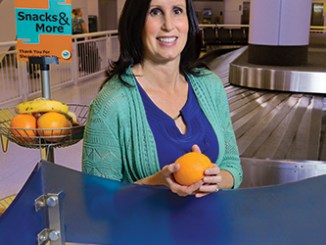
Over the course of a few years, Kristina DeMuth, RD, traveled to Haiti many times. During each trip, she learned something new about the country and its people — their history, culture and diet, and the devastating level of poverty and disease. "I witnessed poverty like I have never seen before. I played with children who had gaunt faces and yellow eyes, who were covered in disease and had distended bellies from parasites or malnutrition," DeMuth says of her first trip.
As she spent more time in the country, she "became aware of the nutrition transition occurring and how the influence of food-aid was displacing rich heritage and encouraging the Westernized diet." DeMuth's last trip to Haiti was an extended one: She spent a year living at a Haitian orphanage, where she monitored children's growth and helped the community reclaim their health through heritage.
Tell us about your work.
My role as a dietitian evolved over my time in Haiti. During the initial stages, I spent most of my time doing basic nutrition assessments and helping children overcome malnutrition. However, I desired to get to the root causes of poor health and develop strategies for preventing both malnutrition and chronic diseases. I was blown away by the lack of fresh produce utilized in the feeding center, even though there appeared to be ample supply available in the local markets. One Haitian man told me that he was sick of eating imported white rice. He told me about other local grains available: sorghum (called "pimit" in Creole) and bulgur (called "ble" in Creole).
I spent most of my time doing community-level work trying to learn about the rich native foods and eating patterns, experimenting with local foods, making frequent visits to the local market to purchase produce and talk with the people about nutrition, and communicating with different agricultural organizations about the vast number of edible plants and plant parts that are available in Haiti.
At the orphanage, I worked with 56 children. I monitored their growth and had many be successful on a weight-gain program using a ready-to-eat therapeutic food called Medika Mamba. I worked closely with a group of Haitian women who are cooks at the orphanage, and we spent the year discovering native foods in Haiti and helping the population to reclaim their health through heritage.
What inspired you to undertake this work or project?
I grew up in a "servant-focused" family. My grandparents were always volunteering in homeless shelters and caring for the needs of people within their communities. My parents made sure to instill service into our family traditions when we were young. We'd spend holidays packing gifts for other families or serving a warm meal to those without food. The opportunity to volunteer in Haiti arose because of my uncle's non-profit mission — a number of family members had taken service trips there. It became a combination of many of these life events and people that sparked my work in Haiti.
What do you find most rewarding about your efforts?
Learning from the Haitian people was the most rewarding parts of my time in Haiti. I am incredibly humbled by the many rich experiences I have had meeting people who are working hard to change their own communities. It's been a life-changing experience for me witnessing what people are able to do with the little resources that they have. Living in Haiti has transformed the way I see the world and inspired me to live a more conscientious life. Recognizing that my daily actions — directly and indirectly — impact the lives of people around the world by what I choose to purchase, what I choose to eat and how I use the world's resources. We live in a global community.
Looking ahead, how would you like to see your project develop or grow?
I am hoping to inspire more orphan care communities and schools to transform their feeding programs to include a rich variety of healthy foods for children. I desire to work with communities, both abroad and here in the United States, to help enhance access to safe and nutritious foods. Furthermore, I hope to inspire all people to live a more conscientious and sustainable life; choosing to eat in a way that protects the planet and their health.
What have you been up to since you left Haiti?
For the past one and half years, I have been back in Minnesota, going to school for my master's in public health nutrition. My experiences in Haiti have led me to great opportunities, such as writing a nutrition chapter for In the Pursuit of Orphan Excellence by Philip Darke and Keith McFarland, and traveling to Uganda for three weeks to conduct my master's thesis project, a qualitative research study exploring the use of the Moringa tree for children's nutrition.
My experiences in Haiti with poverty, hunger and environmental constraints have inspired me to live and promote a more sustainable lifestyle and diet.



